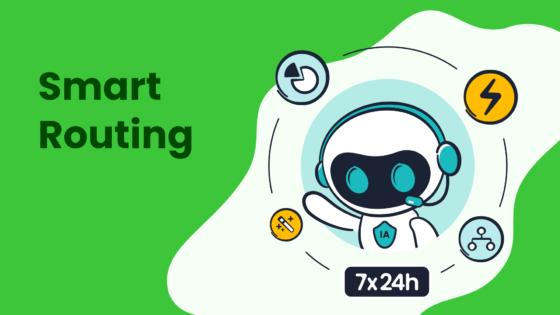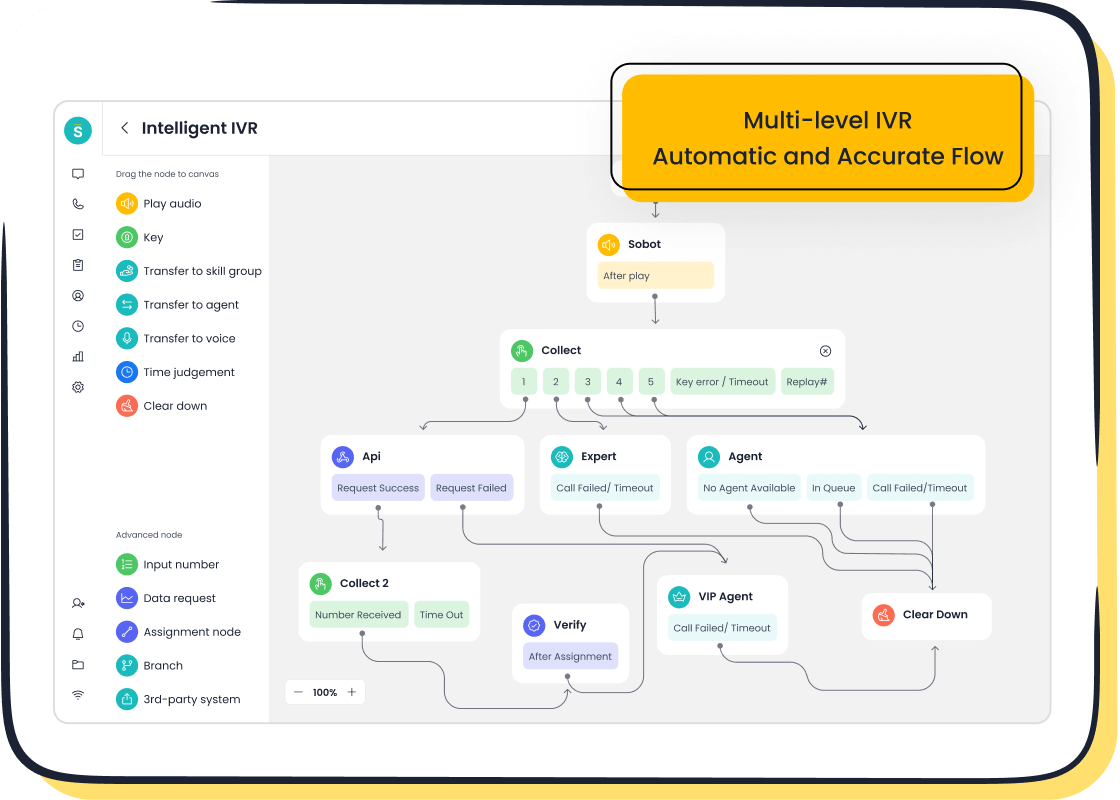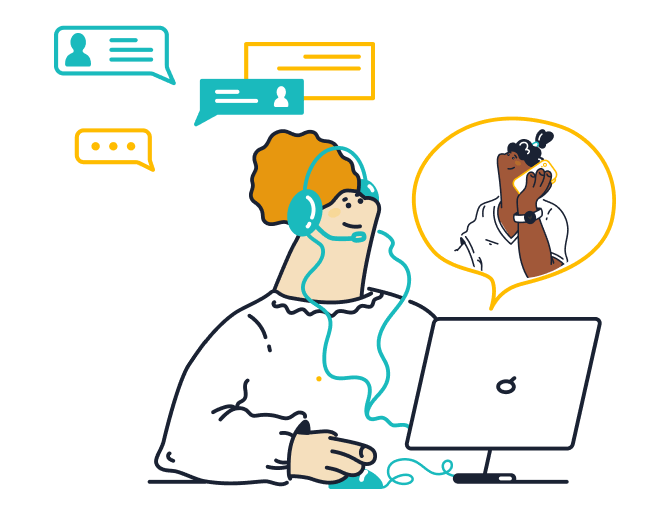Callback Messaging CBM Explained for Modern Communication

Callback Messaging (CBM) allows you to request a callback instead of waiting on hold during customer service calls. This system prioritizes your convenience by eliminating long wait times and ensuring timely assistance. Businesses benefit from CBM by improving communication efficiency and customer satisfaction.
- Analytics from CBM solutions reveal:
- Reduced wait times lead to higher satisfaction scores.
- Improved first-contact resolution rates connect you to the right resources immediately.
- Enhanced loyalty results from better customer experiences.
Callback messaging contributes to operational efficiency by ensuring customers reach the appropriate support team on the first attempt.

Sobot, a leader in contact center solutions, integrates CBM into its Voice/Call Center platform, offering seamless communication and superior customer service.
What is Callback Messaging (CBM)?
Definition and Purpose
Explanation of the term 'Callback Messaging'
Callback Messaging (CBM) is a system that allows you to request a callback instead of waiting on hold during customer service calls. This feature ensures that your time is valued by letting you continue your day while the system schedules a callback at a convenient time. Businesses use CBM to streamline communication workflows, ensuring you connect with the right support team without unnecessary delays.
Key components of CBM include:
- Streamlined Communication Workflows: Integrates with CRM systems for smooth coordination.
- Customer Feedback Collection: Gathers real-time insights through post-call surveys.
- Continuous Improvement: Uses feedback to enhance services and address concerns.
- Closing the Feedback Loop: Responds to feedback to build trust and loyalty.
- Engaging Customers: Involves you in service improvements, fostering a stronger connection.
Why CBM is essential in modern communication
CBM plays a vital role in improving customer experience. For example, during peak hours, you can schedule a callback instead of waiting on hold. This flexibility ensures you receive assistance when it suits you. Businesses benefit too, as CBM reduces call abandonment rates by nearly 37%, improves first-contact resolution rates, and boosts customer satisfaction scores. These advantages make CBM a cornerstone of modern communication systems.
Evolution of CBM
Addressing traditional call center challenges
Traditional call centers often struggled with long wait times and high call abandonment rates. These issues frustrated customers and reduced satisfaction. Callback Messaging transformed this experience by reducing wait times and allowing you to avoid being on hold. It also improved workforce management, enabling businesses to allocate resources effectively during peak hours.
Transition to customer-centric communication systems
The shift to customer-centric systems has made CBM even more impactful. By ensuring you feel acknowledged and valued, CBM enhances your overall experience. Higher satisfaction scores often lead to repeat business and loyalty. Businesses now measure these scores to refine their communication strategies, ensuring they meet your needs effectively.
How Does Callback Messaging (CBM) Work?

The Technical Process
Customer initiates a callback request
When you contact a business and encounter long wait times, Callback Messaging (CBM) offers a simple solution. Instead of staying on hold, you can request a callback through an automated prompt. This process begins with you entering your phone number or confirming your existing contact details. The system then records your request and ensures it is queued for follow-up. This feature not only saves your time but also reduces frustration during peak hours.
Tip: Always ensure your contact information is accurate when requesting a callback to avoid delays.
System queues the request and schedules a callback
Once your request is submitted, the system places it in a queue. Advanced algorithms prioritize these requests based on urgency and availability. For example, if your issue is marked as critical, the system ensures you receive a callback sooner. The scheduling process also considers your preferred time, offering flexibility. Businesses benefit from this streamlined approach by reducing call abandonment rates and improving first-contact resolution rates.
Integration with Call Center Solutions
Role of IVR and automated systems
Interactive Voice Response (IVR) systems play a crucial role in enabling Callback Messaging (CBM). These systems guide you through the callback request process with clear instructions. Automation ensures your request is routed to the right department or agent. This integration minimizes manual intervention, enhancing efficiency. For instance, automated systems can send you updates about your callback status, keeping you informed throughout the process.

How Sobot's Voice/Call Center enhances CBM functionality
Sobot's Voice/Call Center takes Callback Messaging (CBM) to the next level. It uses intelligent IVR and dynamic call routing to ensure your callback requests are handled efficiently. Features like AI-powered Voicebot and CRM integration allow seamless communication. For example, the system can automatically match your request with an agent skilled in resolving your issue. Analytical tools provide insights into customer interactions, helping businesses refine their strategies. With a 99.99% uptime, Sobot ensures reliable and uninterrupted service.
| Integration Method | Description |
|---|---|
| Advanced Algorithms | Outbound dialers simplify outbound call management, prioritizing callback requests based on urgency. |
| Dynamic Call Routing | Automated call routing aligns callback requests with qualified agents based on availability and skills. |
| CRM Integration | Linking callback messaging to CRM systems automates follow-up messages and updates, enhancing transparency with minimal manual intervention. |
| Analytical Tools | Integrating with CRM platforms provides robust analytical tools for analyzing customer interactions and trends. |
Key Features of Callback Messaging (CBM)
Callback Scheduling
Allowing customers to choose a convenient time

Callback Messaging (CBM) empowers you to select a callback time that fits your schedule. This feature ensures you don’t have to wait on hold during busy hours. For instance, if you’re unavailable during peak times, you can request a callback for a quieter period. Businesses use this flexibility to enhance customer satisfaction by respecting your time. Sobot’s Voice/Call Center integrates this feature seamlessly, allowing you to schedule callbacks through an intuitive interface. This system ensures that your request is handled efficiently, improving your overall experience.
Automated reminders for callbacks
Automated reminders ensure you never miss a scheduled callback. These reminders notify you ahead of time, helping you prepare for the conversation. For example, you might receive a text or email reminder about your upcoming callback. This feature reduces missed connections and ensures smoother communication. Sobot’s platform enhances this process by integrating reminders with its CRM system, keeping you informed and engaged.
Queue Management
Reducing on-hold times
Callback Messaging (CBM) significantly reduces the time you spend on hold. Instead of waiting, you can request a callback and continue with your day. Businesses measure this improvement using metrics like average hold time and call abandonment rates.
| Metric | Description |
|---|---|
| Average Hold Time | Measures the average duration customers are on hold, indicating efficiency in queue management. |
| Call Abandonment Rate | Tracks the percentage of calls that are abandoned before being answered, reflecting customer frustration. |
| Callback Messaging | Monitors the number of customers opting for callbacks instead of waiting on hold, enhancing customer experience. |
Sobot’s advanced algorithms ensure your callback requests are processed quickly, reducing delays and improving efficiency.
Prioritizing urgent requests
Prioritizing urgent requests ensures critical issues are addressed promptly. Callback systems identify high-priority cases and connect you to the right agent faster. This approach improves customer satisfaction and first-contact resolution rates.
- Urgent requests receive faster responses, reducing long hold times.
- Callback systems connect you to live agents, enhancing resolution rates.
- Businesses optimize agent availability, lowering costs and improving efficiency.
Sobot’s dynamic call routing ensures urgent requests are handled with precision, delivering a superior experience.
Multi-Channel Support
Integration with phone, email, and chat systems

Callback Messaging (CBM) integrates seamlessly with multiple communication channels, including phone, email, and chat. This integration allows you to interact with businesses through your preferred platform. For example, you can request a callback via a chat window or email, ensuring a cohesive experience. Sobot’s omnichannel platform enhances this process by unifying all communication channels into a single interface, making it easier for businesses to manage your requests.
Seamless transitions between communication channels
Seamless transitions between channels ensure your experience remains smooth and uninterrupted. For instance, you might start a conversation via chat and continue it over the phone without repeating your issue.
| Benefit | Description |
|---|---|
| Enhanced Customer Experience | Customers can interact through preferred channels, leading to a more satisfying and personalized journey. |
| Improved Efficiency | Agents manage multiple channels from a single interface, streamlining workflow and reducing response times. |
Sobot’s Voice/Call Center supports these transitions, ensuring your interactions are efficient and frustration-free.
Purpose and Role of CBM in Communication Systems
Enhancing Customer Experience
Reducing frustration with long wait times
Long wait times often lead to frustration and dissatisfaction. Callback Messaging (CBM) eliminates this issue by allowing you to request a callback instead of staying on hold. This feature ensures you can continue your day without interruptions while waiting for assistance. Businesses using CBM report a nearly 37% reduction in call abandonment rates, as shown below:
| Metric | Value |
|---|---|
| Reduction in Call Abandonment | Nearly 37% |
By addressing this common pain point, CBM improves your overall experience and ensures you feel valued during every interaction.
Providing a sense of control to customers
CBM empowers you by giving you control over when and how you receive assistance. You can schedule callbacks at a time that suits you, ensuring convenience and flexibility. This approach enhances your perception of the service, as businesses can gather real-time feedback after interactions to improve their offerings. The table below highlights how CBM contributes to better customer experiences:
| Evidence Type | Description |
|---|---|
| Feedback Collection | Real-time feedback helps businesses understand customer satisfaction. |
| Continuous Improvement | Feedback analysis identifies areas for improvement, addressing concerns. |
| Customer Loyalty | Higher satisfaction scores lead to repeat business and loyalty. |
Improving Call Center Efficiency
Optimizing agent workload
CBM helps call centers manage workloads more effectively. By scheduling callbacks, agents can handle calls during less busy periods, reducing stress and improving productivity. Key performance metrics include:
- Reduced wait times enhance customer satisfaction.
- Efficient call volume management during peak hours.
- Callback rate measures customer preference for callbacks over waiting on hold.
Sobot’s Voice/Call Center integrates these features seamlessly, ensuring agents can focus on delivering quality service.
Reducing call abandonment rates
High call abandonment rates often indicate inefficiencies in call center operations. CBM addresses this by queuing requests and ensuring timely follow-ups. Customers no longer need to hang up in frustration, leading to better engagement and satisfaction. Businesses using Sobot’s advanced algorithms experience significant reductions in abandonment rates, improving overall efficiency.
Supporting Business Goals
Building customer loyalty
CBM fosters loyalty by making you feel acknowledged and valued. Knowing that your callback request will be honored enhances trust and strengthens your connection with the brand. Reduced wait times and the convenience of scheduling callbacks contribute to higher satisfaction levels, which often translate into repeat business.
Increasing customer satisfaction scores (CSAT)
Customer satisfaction scores (CSAT) are critical for measuring service quality. CBM directly impacts these scores by reducing frustration and improving your experience. Sobot’s platform, with its intelligent IVR and dynamic call routing, ensures your needs are met efficiently, leading to higher CSAT and long-term customer retention.
Benefits and Applications of Callback Messaging (CBM)

Benefits for Businesses
Cost savings through efficient resource allocation
Callback Messaging (CBM) helps businesses save money by optimizing resources. It reduces the need for a large workforce during peak hours, lowering labor costs. Efficient scheduling ensures fewer dropped calls and higher resolution rates, which minimizes wasted time and effort. This streamlined approach allows businesses to allocate resources where they are needed most.
| Benefit | Description |
|---|---|
| Cost Savings | Callback messaging can save businesses money by reducing operational costs. |
| Efficient Scheduling | It leads to fewer dropped calls and higher resolution rates. |
| Workforce Optimization | Reduces the need for a large workforce during peak call times, lowering labor costs. |
Improved customer retention and loyalty
When you feel valued and heard, you are more likely to stay loyal to a brand. Callback Messaging (CBM) enhances customer retention by reducing frustration and improving satisfaction. Businesses that implement CBM often see higher customer satisfaction scores, which directly contribute to increased loyalty. By addressing your needs promptly, CBM builds trust and strengthens long-term relationships.
Benefits for Customers
Convenience and flexibility in communication
Callback Messaging (CBM) offers you the convenience of choosing when to receive assistance. This flexibility ensures you can continue your day without interruptions. For example, if you are busy during peak hours, you can schedule a callback for a more suitable time. This feature respects your time and makes communication more efficient.
Reduced stress and frustration
Long wait times can be stressful. Callback Messaging (CBM) eliminates this issue by allowing you to request a callback instead of staying on hold. This system ensures you receive timely assistance without the frustration of waiting. Businesses that use CBM report significant reductions in call abandonment rates, which means fewer customers hang up in frustration.
Real-World Applications
Sobot's Voice/Call Center in retail and e-commerce
Retail and e-commerce businesses often face high volumes of customer inquiries. Callback Messaging (CBM) helps manage these efficiently. For instance, Lavazza implemented a callback system on their website to handle customer queries. This solution improved response times and increased customer trust, leading to more sales calls. Sobot’s Voice/Call Center offers similar capabilities, ensuring seamless communication and enhanced customer experiences.
Healthcare appointment scheduling
In healthcare, timely communication is critical. Callback Messaging (CBM) ensures you can schedule appointments without long waits. This system improves first-contact resolution rates by connecting you to the right department immediately. It also enhances customer satisfaction, which is essential in a field where trust and reliability matter most.
Financial services and banking support
Financial services rely on efficient communication to maintain customer trust. Callback Messaging (CBM) connects you to the appropriate resources quickly, ensuring your concerns are addressed promptly. This system improves satisfaction scores and fosters loyalty, making it a valuable tool for banks and financial institutions.
Callback Messaging (CBM) has become a cornerstone of modern communication systems. It reduces wait times, making your interactions more convenient and stress-free. Businesses benefit by managing resources effectively, which lowers operational costs. This system ensures you feel valued, fostering loyalty and repeat business. Industries like retail, healthcare, and finance already use CBM to enhance customer satisfaction and streamline operations. As technology evolves, CBM holds immense potential for innovation, offering even more personalized and efficient communication solutions.
FAQ
What is the main purpose of Callback Messaging (CBM)?
Callback Messaging (CBM) allows you to avoid long hold times by scheduling a callback. It improves customer satisfaction by respecting your time and ensures businesses handle inquiries efficiently. For example, CBM reduces call abandonment rates by up to 37%, making it a valuable tool for modern communication systems.
How does Sobot's Voice/Call Center enhance CBM?
Sobot's Voice/Call Center integrates intelligent IVR, dynamic call routing, and AI-powered Voicebot to optimize CBM. It ensures your callback requests are prioritized and matched with skilled agents. With a 99.99% uptime, Sobot guarantees reliable service, improving both customer experience and operational efficiency.
Can CBM work across multiple communication channels?
Yes, CBM supports phone, email, and chat systems. For instance, you can request a callback via a chat window and continue the conversation over the phone. Sobot’s omnichannel platform ensures seamless transitions, making communication smooth and frustration-free.
What industries benefit the most from CBM?
Industries like retail, healthcare, and financial services benefit significantly from CBM. For example, healthcare providers use CBM to schedule appointments efficiently, while banks rely on it to address customer concerns promptly. Sobot’s solutions cater to these industries, enhancing customer satisfaction and loyalty.
How does CBM improve customer satisfaction?
CBM reduces frustration by eliminating long wait times and offering flexible scheduling. Businesses using CBM report higher customer satisfaction scores (CSAT). For example, Sobot’s advanced algorithms ensure timely callbacks, helping you feel valued and improving your overall experience.
See Also
Steps To Configure Batch Messaging For WhatsApp Business
Essential QMS Guidelines For Effective Call Center Operations
Top Strategies For Quality Management In Call Centers
Understanding The Efficiency Of Call Center Automation
A Complete Guide To Implementing Omnichannel Contact Solutions
